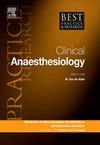Optimizing patients with substance use disorder for cardiac surgery
IF 2.8
3区 医学
Q1 ANESTHESIOLOGY
Best Practice & Research-Clinical Anaesthesiology
Pub Date : 2025-06-01
DOI:10.1016/j.bpa.2025.10.001
引用次数: 0
Abstract
Background
Prehabilitation, incorporating personalized physical, nutritional, and psychological interventions before cardiac surgery, has gained recognition for enhancing patient resilience and improving surgical outcomes, particularly for high-risk populations. Among these populations, patients with substance use disorders (SUDs), including alcohol, tobacco, and other substance misuse, present unique challenges for anesthetic management.
Objectives
This review aims to highlight the most recent evidence on preoperative preparation strategies focused on minimizing perioperative risks in patients with SUDs undergoing cardiac surgery. The goal is to understand how tailored approaches to preoperative care can improve outcomes in this vulnerable group.
The review emphasizes the importance of thorough history-taking, comprehensive clinical evaluation, and optimized perioperative management specific to patients with SUDs. Collaboration among anesthetists, cardiologists, surgeons, and other healthcare professionals is essential to providing holistic care. Active patient engagement in preoperative optimization is highlighted as a crucial factor in improving surgical outcomes.
Specialized preoperative strategies, including the management of substance withdrawal, optimization of cardiovascular function, and enhancement of psychological well-being, are essential for improving surgical outcomes in patients with SUDs. Effective collaboration with multidisciplinary teams ensures a comprehensive, patient-centered approach. Evidence suggests that preoperative optimization, alongside tailored anesthetic techniques, plays a critical role in minimizing perioperative risks and improving recovery.
Conclusion
Prehabilitation strategies, when adapted for patients with SUDs, offer significant benefits in minimizing perioperative complications and enhancing recovery in cardiac surgery. The success of these strategies depends on a comprehensive, multidisciplinary approach, with active patient participation in preoperative optimization. Continued research and standardized protocols are needed to further refine these strategies for this high-risk population.
优化心脏手术药物使用障碍患者
背景:在心脏手术前结合个性化的身体、营养和心理干预的预康复,在增强患者恢复力和改善手术结果方面得到了认可,特别是对高危人群。在这些人群中,物质使用障碍(sud)患者,包括酒精、烟草和其他物质滥用,对麻醉管理提出了独特的挑战。目的:本综述旨在强调最新的术前准备策略的证据,重点是减少心脏手术患者围手术期风险。目的是了解量身定制的术前护理方法如何改善这一弱势群体的预后。这篇综述强调了详细的病史记录、全面的临床评估和优化sud患者围手术期管理的重要性。麻醉师、心脏病专家、外科医生和其他医疗保健专业人员之间的合作对于提供整体护理至关重要。患者积极参与术前优化是提高手术效果的关键因素。专门的术前策略,包括药物戒断管理、优化心血管功能和增强心理健康,对于改善sud患者的手术结果至关重要。与多学科团队的有效合作确保了全面的、以患者为中心的方法。有证据表明,术前优化,以及量身定制的麻醉技术,在减少围手术期风险和提高恢复方面起着至关重要的作用。结论术前康复策略在减少心脏手术围手术期并发症和提高康复率方面具有显著的效果。这些策略的成功取决于一个全面的,多学科的方法,患者积极参与术前优化。需要继续研究和标准化方案来进一步完善这些高危人群的策略。
本文章由计算机程序翻译,如有差异,请以英文原文为准。
求助全文
约1分钟内获得全文
求助全文
来源期刊

Best Practice & Research-Clinical Anaesthesiology
ANESTHESIOLOGY-
自引率
0.00%
发文量
37
审稿时长
36 days
 求助内容:
求助内容: 应助结果提醒方式:
应助结果提醒方式:


